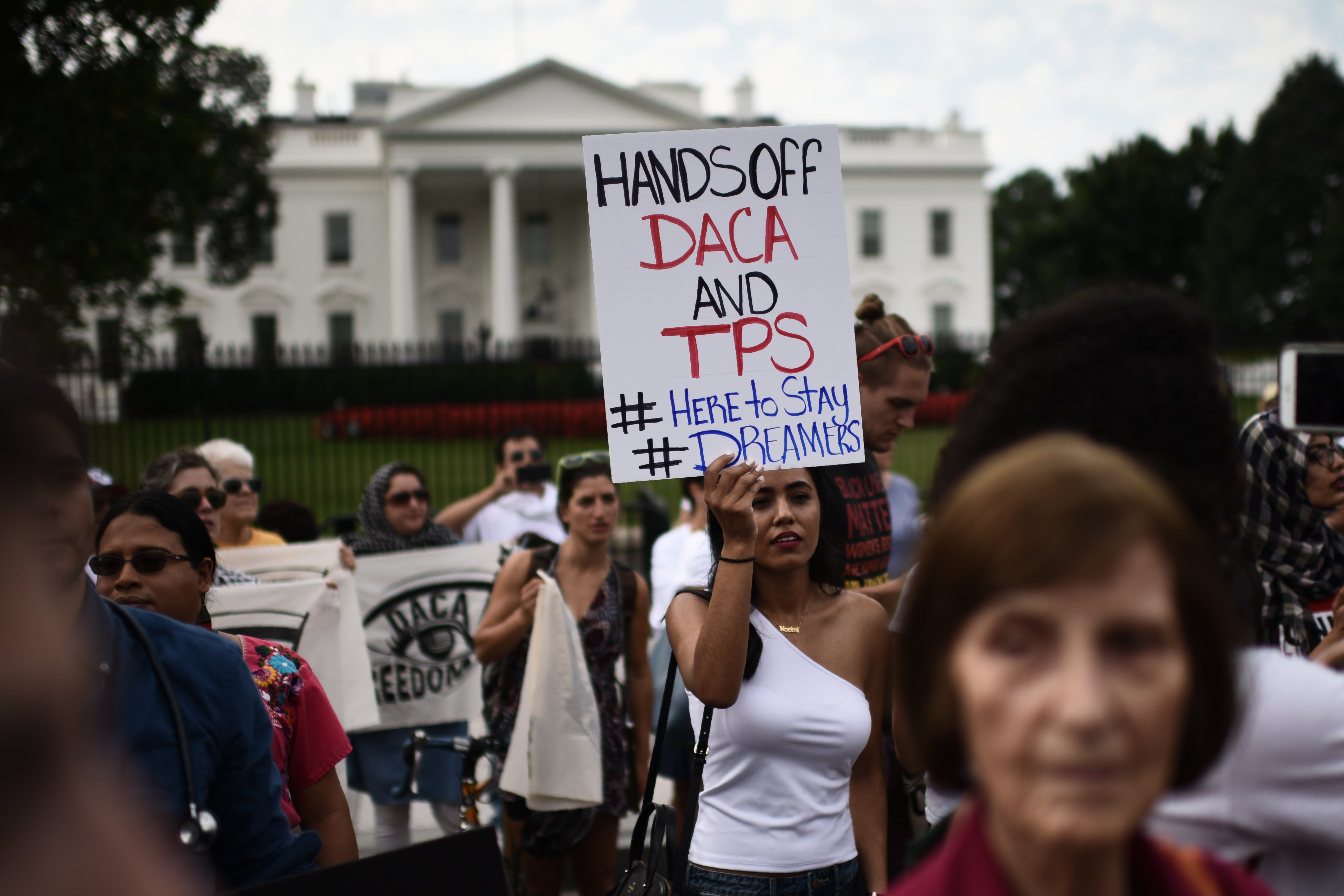How the budget debate got derailed by DACA
Trump does it again


Congress is just a day away from another government shutdown. But unlike the deficit-fueled fights of yesteryear, today's budget showdown revolves around a seemingly unrelated issue: immigration.
This is the story of how President Trump tossed millions of young immigrants into treacherous political waters and nearly capsized government.
It began back in September, when Trump decided to nix the Deferred Action for Childhood Arrivals (DACA) program that protects children who were brought to the U.S. illegally by their parents. Because former President Barack Obama instituted the DACA protections via executive action, DACA only lived by the good graces of whoever occupied the White House. When Trump decided he wasn't interested in preserving the program, he stipulated a six-month window for Congress to pass a permanent legislative fix.
The Week
Escape your echo chamber. Get the facts behind the news, plus analysis from multiple perspectives.

Sign up for The Week's Free Newsletters
From our morning news briefing to a weekly Good News Newsletter, get the best of The Week delivered directly to your inbox.
From our morning news briefing to a weekly Good News Newsletter, get the best of The Week delivered directly to your inbox.
But four and a half months have now passed, and Trump's March deadline draws near. Congress still hasn't figured out what to do about DACA — if anything, the prognosis has only gotten worse.
This is where the budget comes in.
Desperate for a fix, Democrats are now threatening to hold federal funding hostage in order to pressure Republicans to relent on the program. And despite being in the minority, Democrats actually have the legislative leverage to pull it off because any funding bill would require 60 votes to pass the Senate, meaning the GOP needs at least some of their support.
For Democrats, the pressure to come through on DACA stems from the more diverse and socially liberal base that the Democratic Party has cultivated. Since the immigrants protected by DACA, known as the DREAMers, are arguably the most innocent of any group that could face deportation, given they had no hand in their unlawful arrival to the U.S., these individuals inspire the strongest pro-immigration feelings among liberals.
A free daily email with the biggest news stories of the day – and the best features from TheWeek.com
Meanwhile, the GOP has been overtaken by Trump's administration, with its incipient white nationalism, as well as the president's own explicit and vicious opposition to immigration. Despite occasionally giving lip service to a path to citizenship for the DREAMers, the right wing is plainly uncomfortable with the idea and far more concerned with Trump's border wall and instituting new draconian restrictions to legal immigration.
The collision of those two political opposites has made immigration one of the most hotly contested flashpoints in American politics.
Yet for one brief moment, there was hope. Despite the thorniness of the immigration debate, by last week a small bipartisan group led by Sens. Dick Durbin (D-Ill.) and Lindsey Graham (R-S.C.) had hammered out a fix for DACA. The proposal included disbursing funds for heightened border security, while scrapping the "diversity lottery" in favor of visas to cover individuals from countries with Temporary Protected Status, which is extended to immigrants fleeing natural disasters and other catastrophic events. As for DACA itself, recipients would be able to apply for provisional legal status and eventually for green cards and U.S. citizenship, but they would be barred from sponsoring family members for legal status — a concession to conservatives concerned about "chain migration."
But by the time the senators arrived to 1600 Pennsylvania Ave. to discuss the deal with Trump, a gaggle of ultra-conservative Congress members had apparently convinced the president to change his mind — despite the fact that the deal addressed all of the problems the White House had previously outlined to lawmakers. Instead of a blockbuster immigration deal, the lasting result of the meeting turned out instead to be Trump's infamous dismissal of certain nations of origin as "shithole" countries.
The comment was immediately cast as blatant racism, and it betrayed a kind of class prejudice at the international scale. But at its core, it was an example of Trump's fickleness, and the ease with which his mind can be changed by whomever had his ear last. A lot of observers seem to think that, whatever Trump's toxic bloviations, he'll likely sign any deal that actually gets through Congress.
And therein lies the problem. The hardline right-wingers seem mainly upset that the senators' deal didn't include more funding for border security, and they insist that preventing DACA recipients from sponsoring other family members for legal status doesn't go far enough to prevent chain migration. On the flip side, plenty of liberal groups are furious at the deal as is, including the Congressional Hispanic Caucus, the Congressional Asian Pacific American Caucus, and the Congressional Black Caucus.
So who's at the greatest risk politically?
There are 10 Democratic senators who hail from mostly conservative, mostly white states that Trump won. These lawmakers could pay the biggest price if there's a federal shutdown over immigration, because their constituents aren't as concerned about the plight of young immigrants as the larger Democratic base. At the same time, large swaths of the party — and certainly its major presidential contenders — see real political value in making DACA a hill to die on.
Then there's Trump and the GOP. Government shutdowns aren't the end of the world, but they are a huge inconvenience that leaves certain critical government services stalled and thousands of federal employees on furlough and thus without pay. And when it comes time to point fingers, shutdowns tend to get blamed on the party in power.
With a Democratic wave already seeming likely in the 2018 midterms, and loads of Republicans announcing their retirements, this is a dangerous game for the Republican Party.
Jeff Spross was the economics and business correspondent at TheWeek.com. He was previously a reporter at ThinkProgress.
-
 Crossword: December 30, 2025
Crossword: December 30, 2025The daily crossword from The Week
-
 What have Trump’s Mar-a-Lago summits achieved?
What have Trump’s Mar-a-Lago summits achieved?Today’s big question Zelenskyy and Netanyahu meet the president in his Palm Beach ‘Winter White House’
-
 The most anticipated movies of 2026
The most anticipated movies of 2026The Week Recommends If the trailers are anything to go by, film buffs are in for a treat
-
 Bari Weiss’ ‘60 Minutes’ scandal is about more than one report
Bari Weiss’ ‘60 Minutes’ scandal is about more than one reportIN THE SPOTLIGHT By blocking an approved segment on a controversial prison holding US deportees in El Salvador, the editor-in-chief of CBS News has become the main story
-
 Has Zohran Mamdani shown the Democrats how to win again?
Has Zohran Mamdani shown the Democrats how to win again?Today’s Big Question New York City mayoral election touted as victory for left-wing populists but moderate centrist wins elsewhere present more complex path for Democratic Party
-
 Millions turn out for anti-Trump ‘No Kings’ rallies
Millions turn out for anti-Trump ‘No Kings’ ralliesSpeed Read An estimated 7 million people participated, 2 million more than at the first ‘No Kings’ protest in June
-
 Ghislaine Maxwell: angling for a Trump pardon
Ghislaine Maxwell: angling for a Trump pardonTalking Point Convicted sex trafficker's testimony could shed new light on president's links to Jeffrey Epstein
-
 The last words and final moments of 40 presidents
The last words and final moments of 40 presidentsThe Explainer Some are eloquent quotes worthy of the holders of the highest office in the nation, and others... aren't
-
 The JFK files: the truth at last?
The JFK files: the truth at last?In The Spotlight More than 64,000 previously classified documents relating the 1963 assassination of John F. Kennedy have been released by the Trump administration
-
 'Seriously, not literally': how should the world take Donald Trump?
'Seriously, not literally': how should the world take Donald Trump?Today's big question White House rhetoric and reality look likely to become increasingly blurred
-
 Will Trump's 'madman' strategy pay off?
Will Trump's 'madman' strategy pay off?Today's Big Question Incoming US president likes to seem unpredictable but, this time round, world leaders could be wise to his playbook
